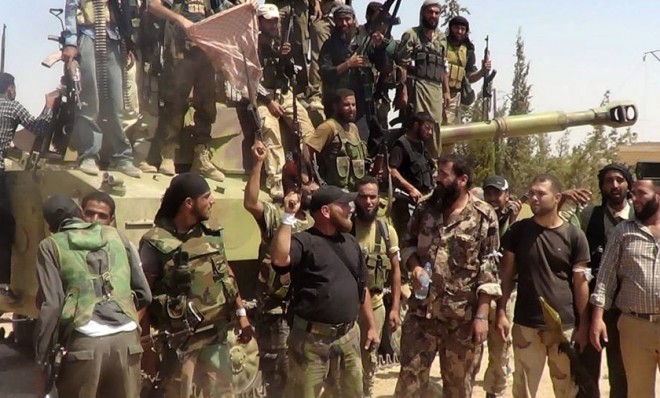Syria's next civil war
Why a violent clash between moderate and Islamist rebels could be a good thing

A free daily email with the biggest news stories of the day – and the best features from TheWeek.com
You are now subscribed
Your newsletter sign-up was successful
There could soon be a civil war within a civil war in Syria.
On Wednesday, a town on the Turkish border long held by moderate rebel group the Free Syrian Army was overrun. Several of their soldiers were killed, and as many as 100 others taken prisoner. Inside the town, opposition activists and journalists were rounded up.
This may read like a description of a successful offensive by the regime of dictator Bashar al-Assad. But in fact, the Free Syrian Army lost the town of Azaz to another prominent rebel group, the al Qaeda-aligned Islamic State in Iraq and Syria (ISIS).
The Week
Escape your echo chamber. Get the facts behind the news, plus analysis from multiple perspectives.

Sign up for The Week's Free Newsletters
From our morning news briefing to a weekly Good News Newsletter, get the best of The Week delivered directly to your inbox.
From our morning news briefing to a weekly Good News Newsletter, get the best of The Week delivered directly to your inbox.
Tensions between the two groups had been growing for some time, with ISIS announcing last week that it would soon launch an anti-FSA operation in northern Syria dubbed "Expunging Filth." And when fighting erupted into the open this week, there was a sense of the inevitable. "We knew this would happen from day one," Abu Admad, an activist with the FSA, told The Independent's Richard Hall. "From the moment foreign fighters came flooding into the country saying they were fighting for jihad and for Sharia we knew it would end like this."
The violence in Azad doesn't mean the FSA and ISIS are now in a full-scale war. "But this is a pretty strong sign it's coming," said Max Fisher at The Washington Post. And if war does break out between the ultra-radical Islamists and their more secular rivals, ISIS will likely have the upper hand. The Islamist outfit has benefited from a flood of weapons and funding sent by its patrons across the Gulf, unlike the FSA, whose backers in the West have provided little arms and ammunition.
Furthermore, ISIS's estimated 7,000 to 10,000 fighters — many of whom are foreign jihadists — have earned a fierce reputation on the battlefield. They have often taken the lead on the front lines, and last month played a key role in the takeover of Menagh air base north of Aleppo, which had held out for two years before an offensive that involved ISIS suicide car bombers, a weapon few opposition groups are willing to deploy.
In the short term, rebel in-fighting can only spell more bad news for ordinary Syrians. If ISIS displaces the FSA, more Syrians will be forced to live under the group's fierce brand of Islamic law. Already, smoking has been banned on the streets of Azaz, one resident told the BBC.
A free daily email with the biggest news stories of the day – and the best features from TheWeek.com
A civil war within the rebellion will also strengthen the Assad regime, which can sit back and watch as its two biggest enemies slaughter each other. And since Assad already has a slight advantage in the war — thanks to the fighting expertise of his Lebanese allies, Hezbollah — this outbreak of intra-rebel fighting will shore up the dictator's belief that he will eventually triumph on the battlefield. In the meantime, he can ignore the U.S.'s efforts to secure a negotiated peace deal.
Still, some analysts think this widening schism between ISIS and more moderate elements of the opposition could ultimately be a good thing. The Supreme Military Council (SMC), the Western-backed group that is attempting to organize the FSA, knows it "can't defeat the regime alone," Paul Salem, director of the Carnegie Middle East Center, told TIME's Aryn Baker. "And they know that the U.S. won't let them win if that means letting [the Islamists] win." But if the FSA and ISIS go to war, the U.S. would be more inclined to ship guns and missiles to the moderate rebel group, knowing they are unlikely to fall into the hands of anti-Western jihadists, who would just as soon kill Americans as regime soldiers.
The Free Syrian Army is already using the battle in Azaz in its campaign for more American military aid. "We cannot fight on two fronts," FSA spokesman Louay al-Miqdad told Hall. "Don't leave us between Assad, Hezbollah, and al Qaeda."
Theunis Bates is a senior editor at The Week's print edition. He has previously worked for Time, Fast Company, AOL News and Playboy.